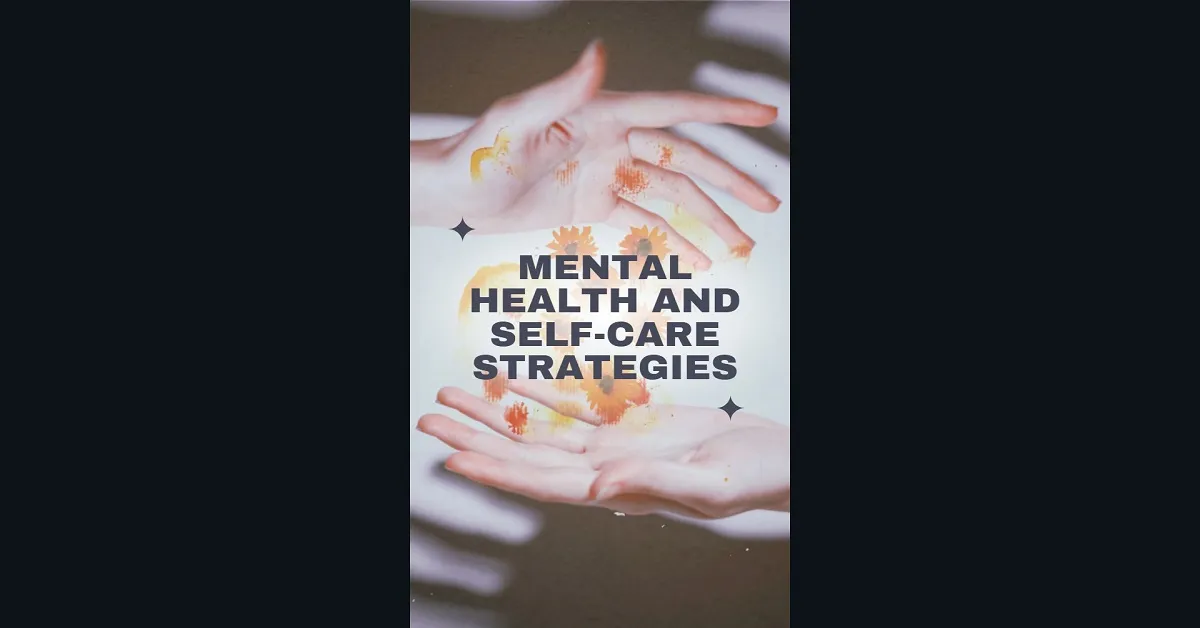Outline of the Article:
Introduction
- Definition of mental health and self-care
- Importance of mental health and self-care
Understanding Mental Health
- Common mental health issues
- Impact of mental health on overall well-being
- The stigma surrounding mental health
Self-Care Strategies for Mental Health
-
Get Enough Sleep
- The role of sleep in mental health
- Recommended sleep duration for adults
-
Exercise regularly
- Physical and mental health
- Benefits of regular exercise
-
Eat a balanced diet
- Connection between diet and mental health
- Importance of a balanced diet for improved mood and cognition
-
Maintaining Emotional Well-being
- Practicing mindfulness and meditation
- Expressing emotions through journaling or creative outlets
-
Building Supportive Relationships
- The importance of social connections
- Seeking support from friends, family, or support groups
-
Managing Stress
- Identifying stress triggers
- Developing stress management techniques (e.g., deep breathing, time management)
-
Setting Boundaries and Practicing Self-Compassion
- Learning to say no and prioritize self-care
- Cultivating self-compassion and avoiding self-criticism
-
Engaging in Relaxation Techniques
- Trying relaxation exercises (e.g., progressive muscle relaxation, guided imagery)
- Incorporating hobbies and activities that promote relaxation
-
Seeking Professional Help
- Recognizing when professional help is necessary
- The benefits of therapy, counseling, or psychiatric support
Incorporating Self-Care Into Daily Life
- Creating a self-care routine
- Overcoming barriers to self-care
- Integrating self-care into different aspects of life (work, relationships, leisure time)
Conclusion
FAQs
- How often should I practice self-care?
- Can self-care completely eliminate mental health issues?
- Are there any self-care practices that don’t require much time or money?
- How can self-care benefit my overall well-being?
- Is it selfish to prioritize self-care?
Mental Health and Self-Care Strategies
Mental health and self-care go hand in hand when it comes to maintaining overall well-being. In today’s fast-paced and demanding world, it is crucial to prioritize mental health and adopt effective self-care strategies. In this article, we will explore various ways to improve mental health and incorporate self-care into our daily lives.
Introduction
Mental health relates to how we feel, think, and behave, impacting all areas of our lives. It includes our emotional, psychological, and social well-being. However, self-care is about actively engaging in practices that support and preserve our physical, mental, and emotional health. By prioritizing self-care, we can actively contribute to our mental well-being.
Understanding Mental Health
Many individuals experience common mental health issues such as anxiety, depression, stress, or mood disorders at some point in their lives. Mental health problems can significantly impact our overall well-being, affecting relationships, work performance, and quality of life. Unfortunately, there is still a stigma attached to mental health, which prevents many people from seeking help or openly discussing their struggles. It is essential to recognize and address mental health concerns without judgment or shame.
Self-Care Strategies for Mental Health
- Get enough sleep: Sleep is essential for good mental health. Lack of sleep can cause irritability, mood swings, and fatigue. It is recommended that adults get at least 7-8 hours of sleep each night.
- Exercise regularly: Exercise is not only good for physical health but also for mental health. Exercise can help reduce stress, anxiety, and depression. It can also improve self-esteem and cognitive function.
- Eat a balanced diet: Eating a balanced diet is essential for good mental health. A diet rich in fruits, vegetables, whole grains, and lean protein can help improve mood, energy levels, and cognitive function.
-
Maintaining Emotional Well-being: Practicing mindfulness and meditation can help manage stress and improve mental clarity. Taking time to connect with our emotions through journaling, art, or music can provide an outlet for self-expression and facilitate emotional healing.
-
Building Supportive Relationships: Strong social connections are vital for mental health. Cultivating relationships with supportive friends, family, or participating in community activities can reduce feelings of loneliness and offer a valuable support system during challenging times.
-
Managing Stress: Identifying stress triggers and developing healthy coping mechanisms are crucial for mental well-being. Techniques like deep breathing exercises, time management, and prioritization can effectively reduce stress levels and increase resilience.
-
Setting Boundaries and Practicing Self-Compassion: Learning to say no when necessary and setting boundaries is essential for protecting our mental health. Practicing self-compassion involves treating ourselves with kindness and understanding, avoiding self-criticism, and acknowledging our own needs.
-
Engaging in Relaxation Techniques: Incorporating relaxation exercises into our routines can help alleviate stress and promote mental calmness. Activities such as progressive muscle relaxation, guided imagery, or pursuing hobbies that bring joy and relaxation can have a positive impact on our well-being.
-
Seeking Professional Help: Recognizing when professional support is necessary is crucial for effective mental health management. Therapists, counselors, or psychiatrists can provide valuable guidance, therapy, and medication if required.
Incorporating Self-Care Into Daily Life
To make self-care a consistent practice, it is essential to create a self-care routine that suits your lifestyle and preferences. Start by identifying the activities that rejuvenate and energize you. Overcoming barriers to self-care, such as time constraints or guilt, is essential. Integrating self-care into different aspects of life, whether it’s at work, in relationships, or during leisure time, ensures holistic well-being.
Conclusion
Prioritizing mental health and adopting self-care strategies are essential for maintaining overall well-being. By understanding mental health, implementing self-care practices, and incorporating them into our daily lives, we can enhance our resilience, manage stress effectively, and lead happier, more fulfilling lives. Keep in mind that taking care of yourself is not self-centered but rather an essential investment in your overall well-being.
Explore more on Health And Fitness.
FAQs
1. How often should I practice self-care?
The frequency of self-care practices may vary from person to person. Ideally, it would be best to incorporate self-care activities into your daily routine. Even small moments of self-care throughout the day can have a positive cumulative effect on your mental health.
2. Can self-care completely eliminate mental health issues?
Self-care is an essential aspect of maintaining good mental health, but it may not eliminate all mental health issues. It can significantly improve your well-being, help manage symptoms, and prevent potential issues. However, if you’re experiencing severe or persistent mental health concerns, seeking professional help is crucial.
3. Are there any self-care practices that don’t require much time or money?
Self-care can be simple and affordable, requiring neither a significant amount of time nor money. Simple practices like deep breathing exercises, taking short walks in nature, enjoying a relaxing bath, or spending time with loved ones can be effective self-care activities that require minimal resources.
4. How can self-care benefit my overall well-being?
Self-care nurtures your physical, mental, and emotional health, contributing to overall well-being. It can reduce stress, improve mood, enhance self-esteem, increase productivity, and foster better relationships. Prioritizing self-care allows you to recharge and be more resilient in facing life’s challenges.
5. Is it selfish to prioritize self-care?
No, prioritizing self-care is not selfish. It is essential to take care of your own well-being so that you can better support and care for others. By investing in self-care, you become more balanced, present, and better equipped to contribute positively to your relationships and responsibilities.





Pingback: How To Improve Your Gut Health With A Balanced Diet - Bitsify
Pingback: Stress-Free Living: The Power Of Progressive Muscle Relaxation - Bitsify